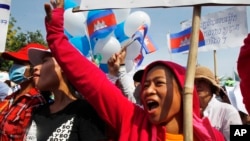Unions will discuss proposals for minimum wage increases in the garment sector next month, officials have said.
The talks will focus on wage increases that would come into effect next year as part of an ongoing process to raise wages in one of Cambodia’s most important economic sectors.
As well as unions, government officials and employers will take part in the talks.
Ath Thon, president of the Cambodian Labor Confederation, said on Monday that the unions would base their negotiations on rising living expenses for workers.
“Firstly, suggestions and requests must be made. We will see what we can do. Secondly, the election pressure will push politicians to think about [workers]. During that time, we will have a chance, meaning politicians will take this opportunity to build more support,” he said.
Cambodia is due to go to the polls next year in a general election.
The annual wage talks were launched in 2014 following mass garment worker strikes after the 2013 election that led to at least five deaths at the hands of security forces.
Thon said that while wages have increased since the strikes, they have not kept pace with inflation.
“There is more the state can do to reduce inflation and the price of goods at the market,” he said.
Pav Sina, president of the Collective Union of Movement of Workers, said it was unlikely that large protests would be held by the labor sector this year, adding that tensions could increase if negotiations did not proceed in a positive direction.
The labor ministry said in a statement that the new minimum wage would be officially set in October and will take effect in January.
Heng Sour, labor spokesman, could not be reached.
Ken Loo, secretary general of the Garment Manufacturer’s Association in Cambodia, warned that if the wage was raised “too much” it would “coerce some enterprises to close.”
Prior to the launching of minimum wage talks in 2014, the base monthly salary for a garment worker in Phnom Penh was $100. In September, the minimum wage was raised to $153 per month.








